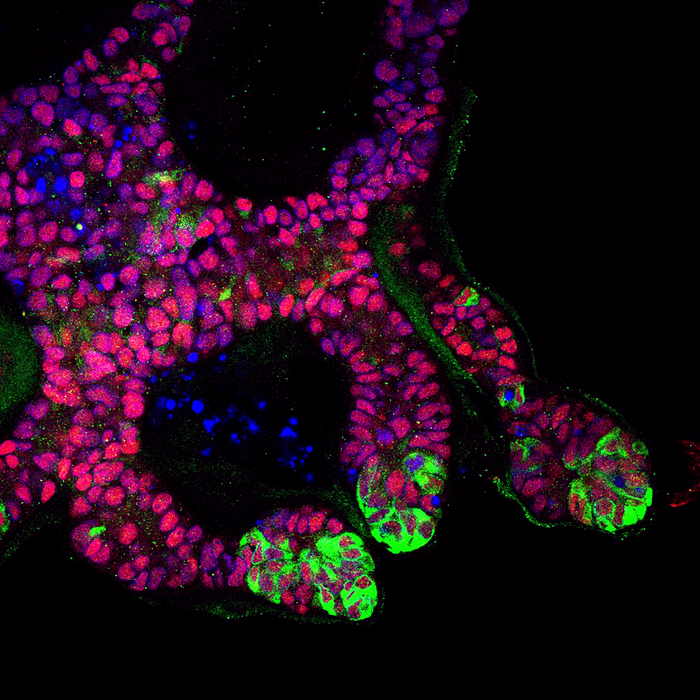Kidney disease affects one in nine adults globally and the incidence of kidney failure is steadily rising around the world. Being able to grow working kidney tissue in a laboratory could help accelerate medical treatments for kidney disease and restore kidney function. The kidney forms normally in humans as a result of two building blocks– metanephric mesenchyme and ureteric bud. The laboratory of Joseph Bonventre, MD, PhD, Chief of the Renal Unit and Founding Chief of the Engineering in Medicine Division at the Brigham, figured out how to generate the first building block– metanephric mesenchyme– resulting in many components of the kidney from human stem cells seven years ago.

Credit: Bonventre Lab/Brigham and Women’s Hospital
Kidney disease affects one in nine adults globally and the incidence of kidney failure is steadily rising around the world. Being able to grow working kidney tissue in a laboratory could help accelerate medical treatments for kidney disease and restore kidney function. The kidney forms normally in humans as a result of two building blocks– metanephric mesenchyme and ureteric bud. The laboratory of Joseph Bonventre, MD, PhD, Chief of the Renal Unit and Founding Chief of the Engineering in Medicine Division at the Brigham, figured out how to generate the first building block– metanephric mesenchyme– resulting in many components of the kidney from human stem cells seven years ago.
The same laboratory has now developed a highly efficient method to generate the second building block (ureteric bud) which matures into the adult kidney collecting system. Further, they demonstrated features of interaction between the cells of these two building blocks, reproducing aspects of interaction which normally occur when the kidney develops. In addition, for the first time ever, the Bonventre laboratory has developed human cell lines of principal and intercalated cell lines, the two cell lines that make up the last urine processing component of the kidney. This research could help investigators test new therapies for treating kidney diseases that affect the collecting system. These include many congenital abnormalities of the kidney and urinary tract, including polycystic kidney disease one most common genetic diseases.
“We have developed a highly efficient way to generate a key component of kidney tissue responsible for maintaining many blood chemistries and critically important for development of the kidney. In addition, we have created, for the first time, human kidney cells that can be used to advance new drugs, aid in investigation of inherited and acquired disorders, and improve our understanding of how the kidney develop and control metabolic balance in the body,” said Bonventre. “Ultimately, with the ability to now generate both components responsible for making functional kidney tissue, this work provides a major step forward in the quest to replace renal function in patients with kidney failure or perhaps, in the future, generate a kidney in a dish.”
Read more in Nature Biotechnology.
Journal
Nature Biotechnology
DOI
10.1038/s41587-022-01429-5
Method of Research
Experimental study
Subject of Research
Cells
Article Title
Human ureteric bud organoids recapitulate branching morphogenesis and differentiate into functional collecting duct cell types
Article Publication Date
29-Aug-2022
COI Statement
J.V.B. is an inventor on kidney organoid patents assigned to Mass General Brigham and is co-founder and holds equity in Goldfinch Bio. K.W.M. has kidney organoid patents pending. J.V.B.ʼs interests were reviewed and are managed by Brigham and Women’s Hospital and Mass General Brigham in accordance with their conflict of interest policies. The other authors have no competing financial interests to declare.




